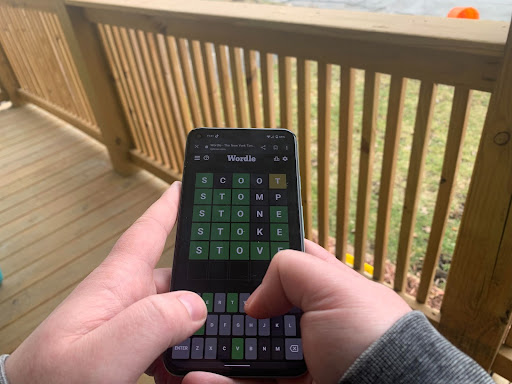New York Times’ Wordle sweeps Utica and the nation

Utica University alumni Jacob Kahl plays NYT’s Wordle on March 30.
April 3, 2022
People have six tries to guess a five-letter word in the New York Times’ daily word game, Wordle. Thousands of people every day log on just to attempt to figure out each day’s designated word.
The game, which was created by software engineer Josh Wardle for his partner, sparked the interest of the public and has rapidly increased in players since its release in October.
The New York Times purchased the game in January and has continued to grow since, according to a PCGamer article by Rich Stanton.
Game rules for Wordle are simple: A player needs to guess a word and if they guess a correct letter the color of the box the letter is in changes. Yellow means that the letter is in the days’ word but not in the correct spot, Green means the letter is in the word and in the correct spot.
The biggest kicker is that there is only one word every day.
Wordle has around 300,000 active players, according to a New York Times article by Daniel Victor. These players are trying to guess the word before those around them which creates a shared goal. It seems that one draw of the game is the competitiveness it creates amongst groups of friends and family members.
“I like Wordle as it is a fun game and challenges you,” senior Gabrielle Ricci said. “I try to beat my sister and see who can get the word in the least amount of tries.”
The game has been discovered by many in a variety of different ways.
Arianna Granza, an early childhood education major, discovered the game on the TikTok @miss__hunter, where a teacher uses the game as a tool to help teach her class every day.
Others have found the game through a variety of social media platforms when people post their Wordle scores for the day.
“I haven’t been playing for that long, maybe about a month,” liberal studies and childhood education major Jordanna Rubino said. “I saw it on Facebook one day and wanted to try it out, especially when I saw other people posting their score things all over. I simply googled it and tried it.”
There are a variety of reasons why people play the game besides the competition it brings when guessing the daily word. Word games have increased in popularity over the past few years with the rise of games such as New York Times’ Spelling Bee and PeopleFun game Wordscapes
“I love the game, and I think it is a great and fun way to improve one’s overall thinking skills,” Granza said. “Especially as an education major, we are taught to make learning fun for students while also giving them the most effective instruction so I think this game is a great way to do that. It also promotes teamwork and idea-sharing in the classroom as well which is so beneficial.”




































































































































